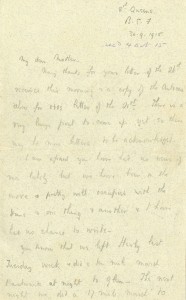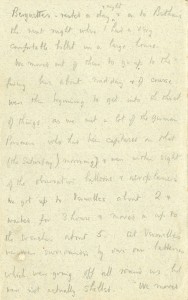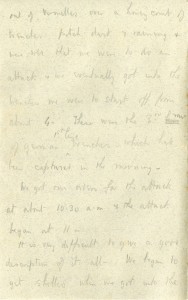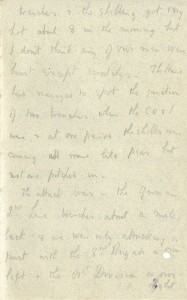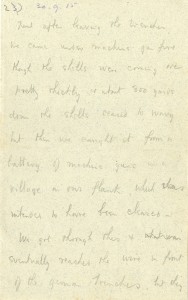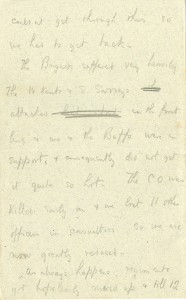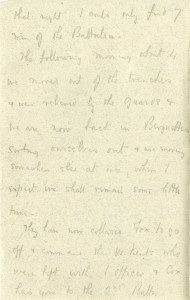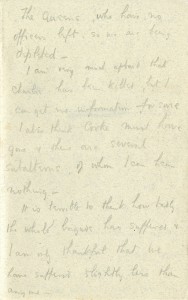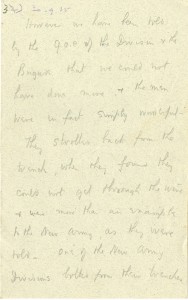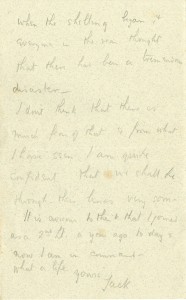Transcription
8th Queens
B.E.F.
30.9.1915
(Rec’d 4 Oct. 1915
My dear Mother,
Many thanks for your letter of the 26th received this morning & a copy of the Autocar also for Odd’s letter of the 21st. There is a very large post to come up yet so there may be more letters to be acknowledged.
I am afraid you have had no news of me lately but we have been on the move & pretty well occupied with the Huns & one thing and another & I have had no chance to write.
You know that we left Herly last Tuesday week & did a ten mile march Eastwards at night to Glem. The next night we did a 17 mile march to Berguettes, rested a day & night, & on to Bethune the next night where I had a very comfortable billet in a large house.
We moved out of there to go up to the firing line about mid-day & of course were then beginning to get into the thick of things as we met a lot of the German Prisoners who had been captured on that (the Saturday) morning & were within sight of the observation balloons & aeroplanes. We got up to Vermelles about 2 & waited for 3 hours & moved on up to the trenches about 5. At Vermelles we were surrounded by our own batteries which were going off all round us but were not actually shelled. We moved out of Vermelles over a honey comb of trenches pitch dark & raining & were told that we were to do an attach & we eventually got into the trenches we were to start off from about 4. These were the 3rd row of German 1st line trenches which had been captured in the morning.
We got our orders for the attack at about 10.30 a.m. & the attack began at 11.
It is very difficult to give a good description of it all. We began to get shelled when we got into the trenches & the shelling got very hot about 8 in the morning but I don’t think any of our men were hurt except scratches. The Huns had managed to spot the junction of two trenches where the C.O. & I were & at one period the shells were coming all round like peas but not one pitched in.
The attack was in the German 2nd Line trenches about a mile back & we were only attacking a part with the 3rd Brigade on our left & the 21st Division on our right. Just after leaving the trenches we came under machine gun fire though the shells were coming over pretty thickly & about 800 yards down the shells ceased to worry but then we caught it from a battery of machine guns in a village on our flank, which was intended to have been cleared.
We got through this and eventually reached the wire in front of the German Trenches, but they couldnt get through this so we had to get back.
The Brigade suffered very heavily. The W. Kents & E. Surreys attacked in the first line & we & the Buffs were in support, & consequently did not get it quite so hot. The C.O. was killed early on & we lost 11 other officers in casualties. So we are now greatly reduced.
As always happens, regiments got hopelessly mixed up & till 12 that night I could only find 7 men of the Battalion.
The following morning about 4 we moved out of the trenches and were relieved by the Guards & we are not back in Berguettes sorting ourselves out & are moving somewhere else at once, where I expect we shall remain some little time.
They have now collared Fox to go off & command the W. Kents who were left with 1 officer & Cox has gone to the 2nd Batta the Queens, who have no officers left. So we are being depleted.
I am very much afraid that Charlie has been killed, but I can get no information for sure. I also think Cooke must have gone & there are several subalterns of whom I can hear nothing.
It is terrible to think how badly the whole brigade has suffered & I am only thankful that we have suffered slightly less than anyone.
However we have been told by the G.O.C. of the Division & the Brigade that we could not have done more & the men were in fact simply wonderful.
They strolled back from the trench when they found they could not get through the wire & were more than an example to the New Army, as they were told. One of the New Army Divisions bolted from the trenches when the shelling began, & everyone in the rear thought that there had been a tremendous disaster. I don’t think that there is much fear of that & from what I have seen I am quite confident that we shall be through their lines very soon. It is curious to think that I joined as a 2nd Lt. a year ago to day & now I am in command – what a life.
Yours
Jack
Commentary
In this letter to his mother, Peirs provides sufficiently more detail on the Battle of Loos than he did to his father only two days earlier. You will notice a difference in tone: when he wrote his father, he was despondent and his narrative was disjointed. It reads like the letter of a disoriented and tired man. In this letter, though, Peirs is demonstrating more coherence, but also confidence. Something has happened – likely rest and with it a regaining of his composure – that has made this account sufficiently more detailed and clearer than his first reaction to what he witnessed on the 26th.
The fact it was written to his mother should also be taken into account. Soldiers often wrote letters to specific family members envisioning their reaction to the contents within. In this case, Peirs likely wanted to portray a certain confident detachment towards the action on the 26th because he was relating these details to his mother, who would obviously be worried about her son’s participation in a botched and bloody attack. Reading the two letters side-by-side – to father and mother respectively – demonstrates that both time and audience matter a great deal to understanding the types of letters written home from battle.
The military details of this letter are rich. Peirs gives not only very specific movements of the battalion as well as a full account of their attack, but also, tells us of German prisoners and some of the scenery of the battlefield. When he destribes the attack, he sticks to the bare essentials: position, unit movements, and the reasons for failure. Of the latter, he writes:
We got through this and eventually reached the wire in front of the German Trenches, but they couldnt get through this so we had to get back.
This was the same man who days before told his father he was ‘too miserable for words’ as he was trying to figure out a way to put that misery, as well disbelief and anxiety, into perspective. ‘So we had to go back’ says nothing of his six-hundred yard journey under fire to reach the safety of the British line only to discover that he was now in command of a battalion due to attrition. ‘What a life’ is right.

